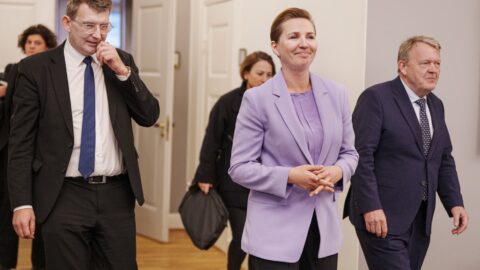A renewed and polarising debate over immigration policy is gaining momentum in Denmark, with key political figures positioning themselves ahead of the next general election. The issue, long a staple of Danish political discourse, has re-emerged due to labour shortages and rising tensions over integration and security.

The government under pressure
Prime Minister Mette Frederiksen of the Social Democrats (Socialdemokratiet) has recently toughened her rhetoric on immigration. This shift follows criticism from the centre-right opposition accusing her coalition of being soft on the rising number of arrivals from Muslim-majority countries. In a strategic move, Frederiksen aligned herself with Italian Prime Minister Giorgia Meloni, calling for reforms to international human rights conventions to enable easier deportations of foreign nationals convicted of crimes.
The move aims to reassert the Social Democrats’ position as the toughest mainstream party on immigration, a stance that contributed to their electoral victory in 2019. However, internal unease within the party is growing, with concerns that further restrictions could alienate voters and generate controversial cases such as that of a long-term resident denied citizenship due to minor offences.

Støjberg and the populist right
Inger Støjberg, leader of the Denmark Democrats (Danmarksdemokraterne), remains a staunch advocate of stricter immigration control. She has questioned the government’s efforts, highlighting the lack of progress on deporting Syrian refugees, establishing permanent border controls, and addressing parallel societies linked to fundamentalist Islam.
Despite her low media profile, Støjberg’s base has remained loyal. Her party’s stability reflects a segment of the electorate that sees her as a consistent voice on immigration. By maintaining a clear critique of the government’s perceived failures without distancing herself too far from power, she continues to shape the debate.
Blue bloc seizes the moment
Other centre-right parties, including the Danish People’s Party (Dansk Folkeparti) under Morten Messerschmidt, are intensifying their calls for Denmark to withdraw from international conventions that hinder deportations. Meanwhile, parties such as Liberal Alliance and The Conservative People’s Party (Det Konservative Folkeparti) are also rethinking their earlier liberal positions on foreign labour, recognising growing concerns about integration challenges.
These parties aim to capitalise on public discontent by driving a wedge between the governing Social Democrats and their centrist partner, the Moderates (Moderaterne). The opposition hopes that immigration, a historically decisive issue in Danish elections, can again become a winning formula.
Fractures within the coalition
Moderates‘ leader Lars Løkke Rasmussen has been a vocal proponent of easing restrictions on foreign workers to address Denmark’s labour shortages. His stance has clashed with Social Democratic ministers who recently highlighted the societal downsides of high immigration, such as pressure on local communities and services.
This discord has spilled into the public sphere, with Moderates accusing their coalition partners of fearmongering. The tension reveals fundamental differences within the SVM coalition over how to balance economic needs with concerns about social cohesion.

A pivotal issue for 2026
As parties prepare for the next general election, expected in 2026, immigration is shaping up to be a central issue. With voters increasingly attentive to the societal impacts of migration and integration, the debate is likely to intensify.
Whether the Social Democrats can maintain their balancing act between centre-right demands and progressive values, or whether the blue bloc will successfully exploit divisions in the coalition, remains a key question in the evolving Danish political landscape.






